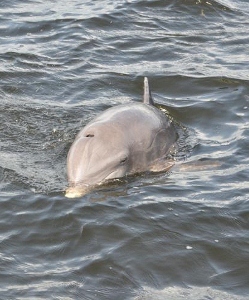Lone dolphin still swimming in Cayman waters
 (CNS): A bottlenose dolphin which appeared in Cayman waters several weeks ago is still in the area and the Department of Environment is re-issuing its warning about the dangers the dolphin poses and is telling people not to swim with the young male. The dolphin continues to approach boats in the North Sound, swimming back and forth within small areas for hours or days and rubbing against moorings and anchor chains. While it may be a rare privilege in the Cayman Islands forpeople to observe dolphins in the wild lone males can be unpredictable.
(CNS): A bottlenose dolphin which appeared in Cayman waters several weeks ago is still in the area and the Department of Environment is re-issuing its warning about the dangers the dolphin poses and is telling people not to swim with the young male. The dolphin continues to approach boats in the North Sound, swimming back and forth within small areas for hours or days and rubbing against moorings and anchor chains. While it may be a rare privilege in the Cayman Islands forpeople to observe dolphins in the wild lone males can be unpredictable.
"People who have approached the dolphin have reported "jaw-clapping", which is the dolphin rapidly snapping its mouth open and shut,” said DOE Research Officer Janice Blumenthal. “Dolphins use behaviours such as jaw-clapping to communicate dominance among members of the pod. In interactions with swimmers, this can convey agitation and aggression and is a clear warning sign."
The reasons why some dolphins become solitary are not well known. While some lone dolphins have become famous for their friendly behaviour, international marine mammal experts have many concerns for the safety of lone dolphins and people when interactions occur. The dolphins sometimes display aggressive and sexual behaviours directed toward swimmers who approach or harass them, leading to serious injuries and even death. In addition, veterinary experts are concerned about the potential for transfer of diseases from dolphins to humans and vice versa.
For lone dolphins, habituation to people often leads to changes in behaviour, infections and injuries such as propeller strikes from inhabiting areas of high human activity.
In Grand Cayman, reports have been received for several years of a solitary dolphin resident in the North Sound. It is not known whether the animal currently being seen is the same long-term resident dolphin. However, given its smaller size when first sighted, DOE believes it might be a young animal which was separated from its pod.
To avoid altering its natural behaviour, DOE asks members of the public who see the dolphin to watch it from a distance, not approach too closely, and not attempt to feed the animal. In order to gather information on the behaviour of the animal, sightings should be reported to DOE by phone (949-8469) or email DoE@gov.ky.
Category: Science and Nature


If he's been here for that long cluttering up the marine infrastructure then he should be paying some sort of tax or enhancement fee………..
The article says a few weeks, but he's been out there on a regular basis since I arrived on island last October. Has any research been done to find out why he travels alone when Dolphins are generally social animals that travel in pods?
Just don't harass him…if you treat him with respect, he'll treat you the same way!